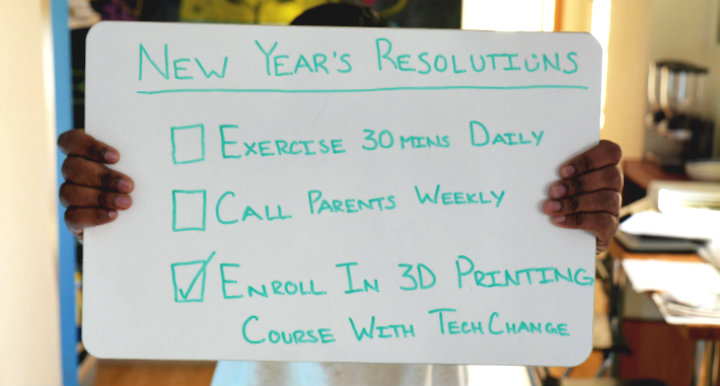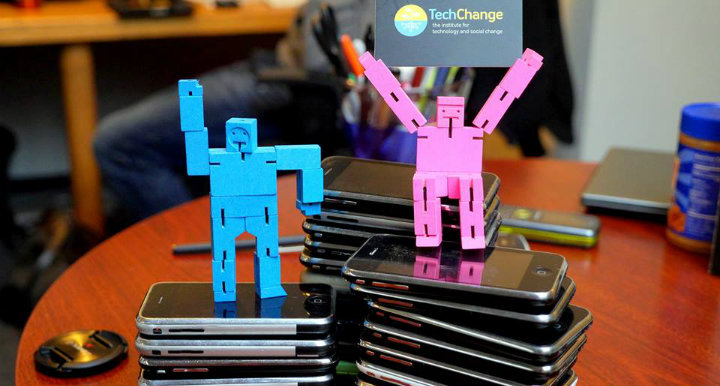When setting new year’s resolutions, we often set goals that include getting healthier, improving our relationships, and advancing our careers. We are fortunate to live in an era where the Internet contains an enormous amount of educational content including online courses that can keep our skills sharp and expertise relevant in a competitive global job market. However, it can be tough to keep up with the all the webinars, articles, blog posts, industry publications, and online courses with life’s competing demands.
Here are some tips on sticking with your professional development goals through online learning from several members of the TechChange alumni community.
1. Define your end goal
Be clear on what you want to get out of the online class. Catherine Shen likes to approach online learning by looking at two specific types of benefits: 1) concrete skills or knowledge, and 2) a course certificate to provide evidence of these new skills or knowledge. “By clearly defining what you want from an educational experience, you are more likely to keep motivated throughout the course with your goals you want to achieve in mind. This goal-oriented mindset is especially important to maintain the discipline needed to regularly log into your courses to earn that certificate when you’d rather be eating chili and watching Game of Thrones,” says Catherine.
Perhaps your goal might include getting a new job or switching to a more social mission-driven career. If that is the case, look at an interactive online learning experience as an investment toward achieving these goals by networking with professionals who could connect you to your next opportunity. Maybe your goal might be to get up to speed on any new industry vocabulary/jargon that you need to be aware of for your current or next job.
2. Schedule in your online learning time like you’d schedule a meeting.
Block off a regular time for your outside learning. Routines can be helpful to structure in time set aside, which might be a daily time or a weekly day for a few weeks. With this regimen in place, you’ll mentally prepare yourself and budget the time needed to get the work done.
If your online course has live interactive learning components like several TechChange courses do, make sure to take advantage of these live sessions as much as possible.
According to mHealth alumna, Lauren Bailey, it is very important to “be diligent and set aside time every day to log into the course — even if you can only spend 20 minutes. Try to attend live events and make sure to ask questions that enhance the discussion.”
Serial TechChange serial alumna Carolyn Florey also agrees with Lauren about the importance of live events. “Make attending live events a priority. Look at the live event discussions as part of your continuing education,” says Carolyn. “Rarely will you get an hour of access to these industry experts. “
According to Mobiles for International Development alumna, Ivy McCottry, who now works at AT&T, “The ‘live event’ sessions are very helpful. Even though these sessions are recorded and archived, it’s good to sit in live because you can contribute questions in real time and process the context of what’s being presented. You also don’t have to mull over content independently – you can send questions immediately or expand on an idea that has been mentioned. When attending these events, I always made sure the facilitator knew I was there at the session so my interests would be covered in the presentation.”
3. Focus on what you’re most interested in and what is most relevant for you.
As mentioned earlier, knowing your end goals helps you focus when your time and energy is limited. “The more you know precisely what you want to gain from the course, the more you will get out of it as you can prioritize those topics and ask questions that will focus discussions on areas you care about most,” said Ivy.
According to mHealth alumni, Dr. Layla McCay, “Various exercises [in TechChange courses] are tailored to what I happen to be interested in so I don’t have to complete every single thing. I can just see what’s relevant for me and take a deep dive into that.”
4. Integrate and apply coursework into your current (or dream) job
Especially for professionals who get professional development funding from their employers, it can be very helpful to set expectations with a supervisor before beginning a course to discuss how to apply learnings into current or future projects. Applying your new skills/knowledge to your work could mean starting a new project or sharing your learnings with a team-wide presentation or brown bag lunch sharing session. By making your employer aware of your professional development goals and let them know how you’re going to use this class next in your work to benefit an organization, you can further your career.
Mobiles for International Development alumnus, Trevor Knoblich, recommends leveraging TC105 or other courses within your own organization. “If you’re advocating for your organization to adopt new mobile tools and applications, you will have a variety of useful materials from TC105 to help make your case,” says Trevor.
Many TechChange alumni also use their online courses as a testing ground to experiment with new technologies in their current work projects. For example, Sairah Yusuf at Generation for Peace did so by visualizing the participants of a training program by creating a map of participants across the Middle East using MapBox. A team based in Hanoi and Ho Chi Minh City at FHI 360 Vietnam created mHealth pilots to address HIV based on the knowledge they acquired from taking their mHealth online course as a group.
5. Make connections by participating as much as you can.
Ivy highly recommends networking with guest speakers and course participants. “If speakers represent organizations that you want access to, definitely enroll in the course. The access that TechChange provides at this dollar value is unheard of and a great return on investment,” said Ivy. “Read profiles of other people who were taking the class and alumni as well. I was definitely inspired by the success stories of Carolyn Florey and Trevor Knoblich who advanced in their careers with the help of TechChange courses.”
Carolyn also suggested for online learners to “Read through other participants’ comments and questions. Often, other participants will have experience you don’t, so they’ll have some informed questions and insightful comments.”
According to Trevor, “You’ll ultimately get more out of the course the more engaged you are with your classmates, the professionals who are presenting, and the TechChange staff.”
Lauren agreed. “Be sure to reach out to classmates and find out more about their backgrounds and career paths. It’s great to have connections from all across the globe!” Throughout the duration of the course and even after, there will be opportunities to connect with course participants online and offline, from Washington,DC to Lusaka, Zambia.
Any other tips that have worked for you? Please share your online learning tips in the comments or tweet us @TechChange. Don’t forget to invest in your career by taking a course with us.




